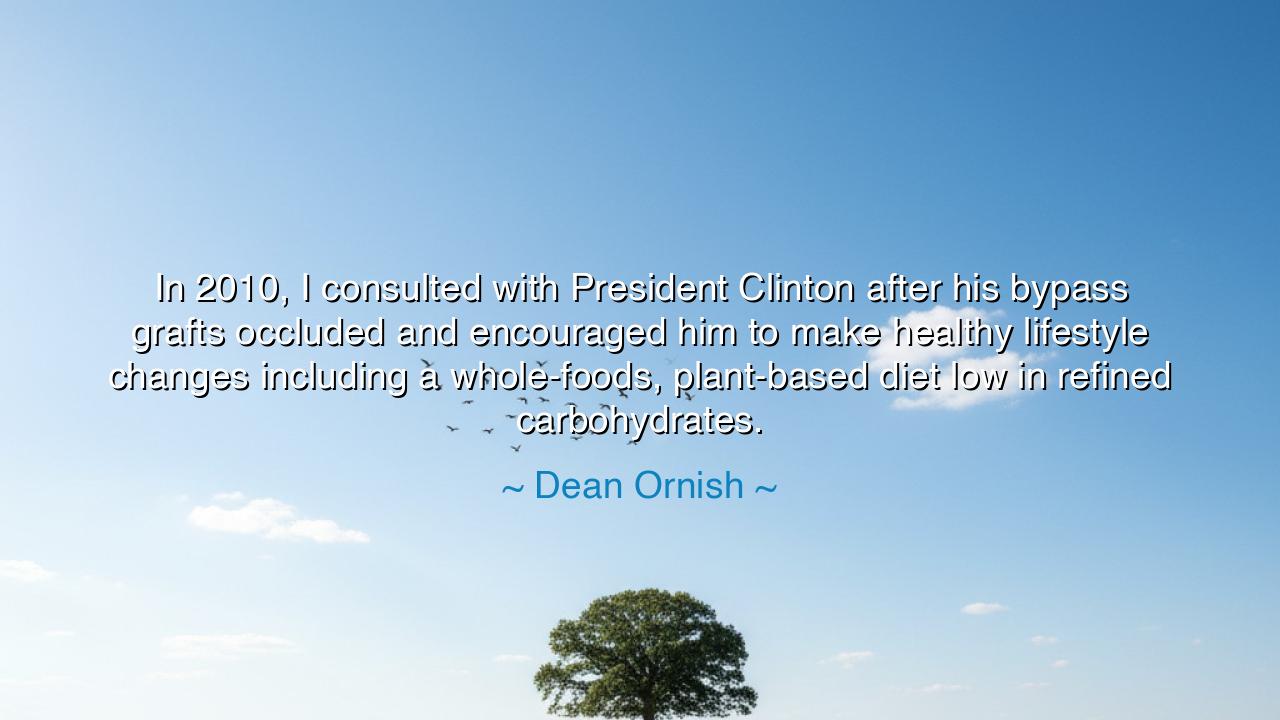
In 2010, I consulted with President Clinton after his bypass
In 2010, I consulted with President Clinton after his bypass grafts occluded and encouraged him to make healthy lifestyle changes including a whole-foods, plant-based diet low in refined carbohydrates.






The words of Dean Ornish, “In 2010, I consulted with President Clinton after his bypass grafts occluded and encouraged him to make healthy lifestyle changes including a whole-foods, plant-based diet low in refined carbohydrates,” are not merely the recollection of a medical moment — they are a testament to a turning of the tide, a meeting between science and spirit, between discipline and redemption. In this quiet sentence lies the echo of an ancient truth: that even the powerful, even kings and rulers, must bow before the laws of nature. For no title, no wealth, no fame can protect the heart that is not cared for. The body, like the earth, yields only to those who treat it with reverence.
In the year 2010, when President Bill Clinton faced the closing of the vessels that had once been reopened by human hands, his heart told a story older than medicine — a story of excess, of indulgence, of forgetting the sacred rhythm of balance. And there entered Dean Ornish, physician, philosopher, and healer of both body and soul, carrying not a sword but wisdom. He did not prescribe another operation or a harsher drug; he offered something far more ancient and enduring — the path of restoration through simplicity, through a whole-foods, plant-based diet, through the return to harmony between body and nature. This was no small counsel. It was a return to the first principle: that health, like peace, begins not in the hands of others, but in the choices we make each day.
The ancients understood this truth well. The Greek physician Hippocrates, often called the Father of Medicine, once declared, “Let food be thy medicine and medicine be thy food.” In his words, we find the seed of Ornish’s philosophy. Both men, though separated by millennia, shared the same revelation — that healing begins not in the hospital, but at the table; not in the pill, but in the act of mindful nourishment. When Ornish guided a former president toward plant-based living, he was not inventing something new, but reviving the oldest wisdom of all: that the earth provides all we need to heal, if only we have the humility to listen.
In the story of Clinton’s transformation, there is also a lesson in renewal. Here was a man who had led nations, whose voice shaped history — yet even he had to learn anew how to live in alignment with life itself. To turn from indulgence to moderation, from meat to plants, from convenience to consciousness — this was a quiet act of courage, an inward revolution. The victory here was not political but personal. For when one who has lived by power chooses instead discipline, when one who has lived by appetite chooses instead awareness, that is a triumph greater than any won on the battlefield or the ballot.
This moment between healer and leader also reveals something deeper about responsibility. Ornish’s work has always carried the conviction that health is not punishment, but liberation — that to eat wisely is not to deny oneself joy, but to rediscover it in its purest form. He teaches that each of us, whether humble or mighty, must care for the vessel that carries our soul. Our bodies, like gardens, will wither if neglected, yet flourish when tended with love and intention. When Clinton embraced this teaching, he did not simply extend his life; he honored the life that had been given to him — and through his example, reminded others that change is never beyond reach.
In this, we see a reflection of ancient heroism — not of conquest, but of self-mastery. The sages of old would say that the greatest battle is not fought with swords but within the self. Ornish’s call to a plant-based path was not a command, but an invitation — to battle the habits that enslave, to overcome the illusions of convenience, and to rediscover the quiet strength of balance. It is a hero’s journey dressed not in armor, but in humility — the journey from indulgence to awareness, from illness to wholeness.
Let this be the teaching: health is a form of wisdom. It is not found in the fleeting pursuit of pleasure, nor in the avoidance of pain, but in the harmony between the two. To live rightly is to live with care — to choose food that nourishes rather than depletes, to fill one’s days with gratitude instead of consumption. Begin, then, as Ornish taught the president: not by chasing cures, but by embracing change. Eat from the earth, drink from simplicity, and let your choices honor the miracle of life that beats within you.
For in the end, even the mightiest heart can falter — but it can also heal. And when it does, guided by wisdom and humility, that healing becomes not just personal salvation but a beacon for all who follow. The lesson of Dean Ornish and President Clinton is timeless: that renewal is always possible, that discipline is freedom, and that through compassion — for our bodies, for the earth, and for one another — we can restore the sacred balance that sustains both life and soul.






AAdministratorAdministrator
Welcome, honored guests. Please leave a comment, we will respond soon